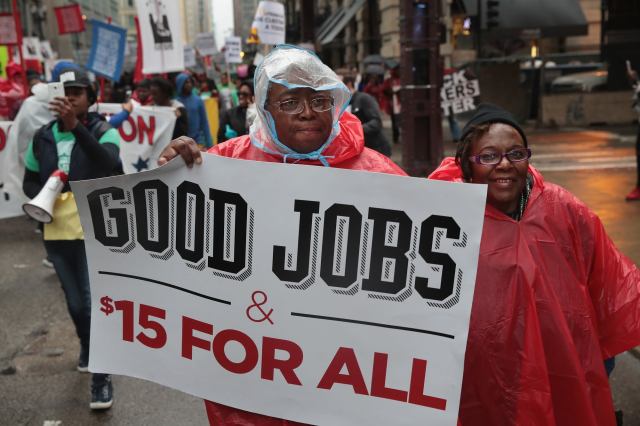Credit: Scott Olson/Getty Images

Globalisation, automation, rationalisation – it’s a wonder that anybody, anywhere has a job. And yet in some western economies full employment is becoming the norm – and not just in the thriving global cities.
In a piece for the Atlantic, Annie Lowrey reports from Iowa. The Hawkeye State is deep into America’s flyover country, but seems no less the busy for it:
“Full employment — that magical economic state, in which everyone who wants work has it, and at a good wage too — finally seems to be near. In much of Iowa, it already is. Out of every 100 people who want a job, 98 or 99 have one. The rate of wage growth has doubled of late, and businesses are scrambling to find workers.”
In theory, full employment ought to be good for workers – and in many ways it is: “Full employment has a remarkable way of improving the lives of low-wage workers and drawing new individuals into the labor force.” However, it “also exposes the scars that even a very hot economy is unable to heal.”
Though the law of demand and supply has enabled Iowan workers to “demand higher wages, better working conditions, more generous benefits, training programs, and myriad other perks”, these improvements are from a low base:
“Low wages continue to be an extraordinary problem preventing workers from connecting with a good job and keeping potential employees on the sidelines — in Iowa and across the country. ‘Even though we’re such a low unemployment state, we are also low-wage state,’ [Elizabeth] Buck of the United Way said. ‘People think that when you have a state or a community that has low unemployment, that everyone’s doing great. That is not the case. We still have about 34 percent of central Iowans who are not making enough to be financially self-sufficient.’”
The United Kingdom is another economy at close to full employment – despite its high level of exposure to the financial crisis, despite Brexit and despite its poor productivity performance. As in the US, jobs are being created just about everywhere not just the economic hotspots. However, as brought home in James Bloodworth’s audio documentary for UnHerd, job creation doesn’t guarantee a good wage, dignified working conditions or job satisfaction.
Lowrey mentions that Iowa’s comparatively affordable housing makes it easier to get by on a low wage – something that’s true of many other flyover job markets. But even low-ish rents and mortgage payments don’t leave much, if anything, left over from a slender pay packet.
To truly thrive, workers need all three of the following: full employment, a decent wage and affordable housing. Unfortunately, western economies only seem to be able provide, at best, two of those three things.
In places like Iowa, that is items one and three – the jobs and the housing. The thriving global cities provide plenty of jobs and, for those with the right skills and knowledge, good money; however, the housing costs are horrendous. The third model can be found across much of continental Europe: not-so-crazy house prices combined with decent pay and social protections for those lucky enough to have jobs, which is all too few (especially among the young). We could call these three models ‘Iowa’, ‘London’ and ‘Italy’.
Can we escape this trilemma? It’s a good question, but perhaps a better one is which of the three models is best-placed to break free.










Join the discussion
Join like minded readers that support our journalism by becoming a paid subscriber
To join the discussion in the comments, become a paid subscriber.
Join like minded readers that support our journalism, read unlimited articles and enjoy other subscriber-only benefits.
Subscribe